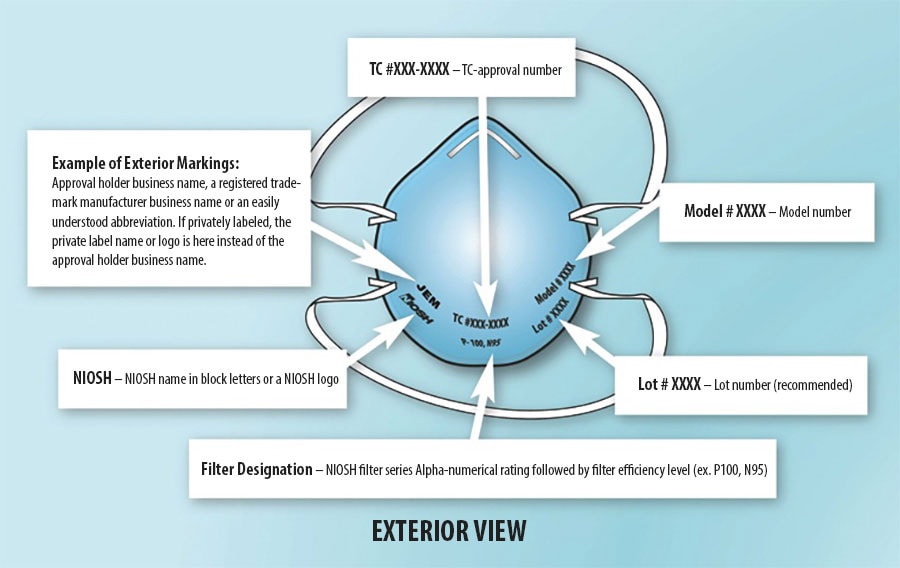Not resistant to oil. To help you make an informed decision in your sourcing weve compiled this guide on N95 KN95 P95 and other similar respirator masks including.
 Approved Particulate Filtering Facepiece Respirators Npptl Niosh Cdc
Approved Particulate Filtering Facepiece Respirators Npptl Niosh Cdc
Strongly resistant to oil.

N100 vs p100. AI Machine Learning. NIOSH requires a minimum of 95 and 9997 efficiencies for N95 and P100 FFR respectively. Thus the weakest respirator that still receives a classification is N95 which filters 95 of non-oil particulates.
V100 is 3x faster than P100. N100 and P100 Masks for Protection against Avian Flu Swine Flu and Other Diseases. Speaking for myself its the worst I have ever.
P99 Filters at least 99 of airborne particles. The number in a rating tells you the minimum amount of airborne challenge particles the mask protects against. With the array of masks on the market it can be challenging to discern the differences and to figure out which are best suited to your needs.
N100 P100 particulate respirator for smoke and airborne pollutants. The Centers for Disease Control tested N100 and P100 masks for their efficacy against avian flu swine flu and other contagious diseases and found them to provide superior protection. These particles are typically 5 microns or larger.
A Prep Battle between the 3M N100 Particulate Respirator 8233 Mask and the 3M 9211 Cool-Flow N95 Particulate Sanding Respirator Mask. The growing adoption of AI and machine learning. A little online research will reveal that the flu virus is 17 microns in size.
When a sick patient wears a respirator the respirator. There are of course even more extreme forms of breathing protection available for cases where even a respirator wont suffice. It protects the wearer from at least 998 of particles.
BY niveditha umbrey - Apr 26 2021. Somewhat resistant to oil. If you primarily require a large amount of memory for machine learning you can use either Tesla P100 or V100.
Clearly smaller than even N100 masks can filter out. On-Premise GPU Servers Vs GPU Cloud Servers. It filters exactly the same stuff the only difference is it also filters out oil-based aerosols if you were working with chemicals.
To better understand the filtration performance of NIOSH- and CE-marked FFRs initial penetration levels of N95 P100. Meanwhile the EN requires 94 and 99 efficiencies for FFRs class P2 FFP2 and class P3 FFP3 respectively. Youre probably used to seeing respirators with labels such as N95 or P100 but this rating system is actually made up of two parts.
The mean penetrations of viable MS2 through the N95 and P100 FFRscartridges were typically less than 2 and 003 respectively under all flow conditions. This is NOT really a c. Strongly resistant to oil.
The N95 mask keeps out at least 95 of particles. N95 has a filter efficiency of at least 95 whereas P100 has a filter efficiency of 9997. R95 Filters at least 95 of airborne particles.
However it is critical to understand that the flu virus does not float in the air by itself. Since N100 respirators and P100 respirators are capable of. The past two day has shown the worst air quality I have ever seen apparently as bad as in Beijing due to the Camp Fire the most destructive fire in California history.
But it is not oil resistant. All N95 and P100 FFR and cartridge models assessed in this study therefore met or exceeded their respective efficiency ratings of 95 and 9997 against the viable MS2 test aerosol even under the very high flow conditions. The relative performance of the NIOSH-approved and EN-certified Conformité Européen CE-marked FFR is not well studied.
An N95 mask keeps out at least 95 of particles but isnt oil resistant and a P100 mask is oil proof while protecting the wearer from at least 998 of particles. Jim Seneczko from AFC International discusses the flu pandemic and respirator choices for protection. The flu virus is transported from patient to patient on droplets of excretions from sneezing and coughing.
The letter denotes the type of material used in the respirator filter media and the types of hazards it protects against while the number refers to the filters ability to remove the most-penetrating particle size while working in the field. We are going to cover two very popular mask options P100 and N100 and help you understand them better. The N designation means that these respirators are not resistant to.
P100 masks are designed for utmost comfort and stability. The filtering efficiency of masks plays a critical role in determining which mask is more efficient for use. N100 and P100 Respirators.
N100 Filters at least 9997 of airborne particles. KN95 vs P95P100 Masks - Differences and Guidelines for Usage. Each P100 mask in our inventory meets OSHA and NIOSH standards.
When it comes to oil resistance this mask is much advanced than R-rated masks. A P100 or N100 are both equal in terms of filtering out soot. Like all P masks the P100 is 100 oil proof.
P95 Filters at least 95 of airborne particles. It has an oil-proof filter that blocks out all kinds of oil-based particles from the air you breathe. The strongest is P100 which filters 9997 of oil and non-oil particulate.
BY Manohar Reddy - Apr 20 2021. Protection from debris and materials that are larger than 03 microns or greater can be achieved with N100 and P100 respirators are ideal for dusty and oily applications. I wrote about the health hazards of some in P100 N100 Particulate Respirator Works for Smoke back in July.








